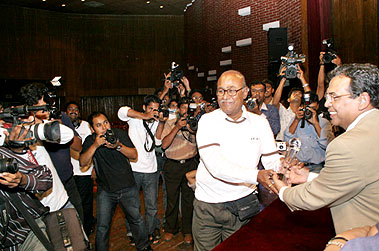Subscribe to ShahidulNews
![]()
Rashid Talukder 1939 – 2011
?Daktaaar?. The loud call would be promptly followed by a big grin and a bigger bear hug. He insisted on calling me by that title and always referred to it, when addressing me in public. Rashid Talukder (Rashid Bhai ? elder brother – to all of us) didn?t speak ?posh? Bangla, struggled somewhat with English and wasn?t encumbered with any of the polish of ?bhodrolok? upbringing many of us were trapped in. Unlike many others however, he took pride in his upbringing. That his apprenticeship involved making tea for the darkroom team, was something he was completely at ease with. There lay his charm. Quick witted, fast on his feet, streetwise, gregarious, loud and completely disarming. Rashid Talukder was an unlikely rebel who was impossible to dislike. He took ownership of my title. Despite his genius, he was all too aware of how photojournalists were regarded. In a profession way down in the pecking order of the hierarchical newsroom, he had felt the full brunt of the class structure where the photojournalist was the illiterate worker. Visually illiterate news editors would call the shots when it came to picture use. The concept of a picture editor had never entered newspaper parlance. The status my Daktar title implied to a photojournalist was something we were all going to share.

Those were the days one would check the chemistry in the developer from its taste. An extra puff of the cigarette would serve as a safelight to check if the film had been sufficiently exposed. Deadlines often meant printing directly from wet negatives. Once the twin lens reflex cameras gave way to the more versatile 35 mm, the film stock itself was often the back end of a roll of cine film bought cheaply from movie industry rejects. Fibre base wasn?t a fashionable thing in those days. It was the only type available. Chinese Xiamen and Era paper were found in limited grades with changes in the chemistry providing variation in contrast. It was in those grueling unventilated toilets converted to darkrooms that Rashid Bhai made print after print that documented the painful, rebellious, joyous moments of a young nation in the making.
I chided him for the fact that he had never made any contact sheets. His life?s possession, a garbage bag filled with negatives in no specific order or category, made it impossible to work from his archives. But what photographs! This was the man who had witnessed every major event in Bangladesh?s turbulent history. Interspersed between the iconic images of our nation?s past were the curious observations of a natural story teller. Kids bathing in the river with a real live elephant for a rubber duck. The courtship rites of hill people, a child being blessed by a sadhu, a duck sedately walking her ducklings across a busy Motijheel street were the slices of life that peered out of the more remembered seminal moments of our history that this remarkable photojournalist had meticulously recorded.